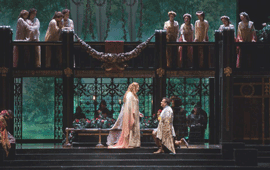> [Archived] Chronicles

Live in HD from the MET - Francesca da Rimini - The Performance!
remains a document in the history of music, emblematic only for a certain creator and for a certain period even if, for a short time, Zandonai was considered Puccini's descendant.
The story is romantic, therefore…sad. The libretto written by Tito Ricordi is based on a play by Gabriele d'Annunzio, inspired by Dante's Inferno (The Divine Comedy). The plot unfolds in Ravenna and Rimini, in the 14th century. The young, beautiful and rich Francesca Polentani falls in love with the handsome and brave Paolo Malatesta, belonging to an equally well-off family, but because of politics, she is forced to marry his brother, the deformed and cruel Giovanni. However, Paolo continues to love Francesca. Their guilty love is disclosed and Giovanni kills them both.
Francesca da Rimini returns to the MET after 27 years. The American premiere of the opera took place on this stage in 1916, but after only two years the title disappeared from the playbill. It returned in 1984, in 1986, and then it disappeared again until today, when the performance is a notable success due to the stage production - setting, costumes and pyrotechnical effects.
It's not a new production, but the reprise of the one signed by Ezio Frigerio (settings) and Franca Squarciapino (costumes). When the curtain is lifted, there is spontaneous applause, as the audience is amazed at the beauty of the settings. In turn, in front of us there are sumptuous palaces and Renaissance gardens, ramparts and towers, alcoves that seem especially designed for secret love stories. I had the constant feeling I was seeing some huge tapestries woven with care, art and imagination and, most of all, with the joy of recounting again and again the tragic love of the couple Francesca - Paolo. The splendid costumes are also a delight for the eye. There's a spectacular prodigality of luxury and art-nouveau inspiration, with richly-embroidered velvet, in marvelous tones of oxblood, blue, black, grey…, colours ranging from light and hope to somber and dark, which follow and concretely suggest the unfolding of the story. I don't think I have ever seen such a beautiful performance from the visual standpoint! It will certainly remain in my mind and soul as an unforgettable moment.
The same can be said about the Dutch soprano Eva-Maria Westbroek. She is as pretty as a picture, with a voice capable of both delicate nuances and energetic interpretations, with a stage presence reminding one of period paintings; her acting is simple and natural, perfectly matching the setting. Also helped by the wonderful costumes, Eva-Maria Westbroek was truly Francesca da Rimini, the character that, from now on, will always make me think of her. The duration of the part, the massive and tense flow of the music, the emotional load of some lengthy scenes when the artist is required not to sing, but only to express, convey a feeling, a state of mind, make the artist's success all the more praiseworthy. I refer here to the end of the first act, the first time that Francesca and Paolo meet, when all the two young people can do is look at each other, without a word, while the orchestra using gossamer-like sounds and an angelical women's choir discreetly suggest the emotion of overwhelming feelings. The soprano, who made her debut on the MET stage two years ago, in the part of Sieglinde in Richard Wagner's Die Walküre, emphasized now the fragility of the character, Francesca's vulnerability (she sang the part for the first time in Monte Carlo, last year).
Unfortunately, I think that the wonderful Eva-Maria Westbroek would have deserved a better partner than Marcello Giordani who struggles with his part, both vocally and as stage presence. On the other hand, the American bass-baritone Marc Delavan, with his thundery voice and stage-filling presence, accomplished an exceptional Giovanni Malatesta. The soloists' quartet is very well completed by Robert Brubaker as the third brother, Malatestino; he is a singer-actor possessing generous resources. This time, the supporting roles were carefully cast, so the beautiful mezzo-soprano Ginger Costa-Jackson (Smaragdi) and Francesca's ladies in waiting give an impeccable performance.
The conductor Marco Armiliato and the famous MET orchestra had a somewhat …unsatisfying role in this production. From the musical point of view, the composer Riccardo Zandonai only managed to practically bring together more or less exact quotes of the great creators in the lyric theatre of the period and I remember I got tired of taking my 'hat' off to Pietro Mascagni, Puccini, Richard Wagner, Richard Strauss…Besides, I had the feeling of listening to some accompaniment music, because if my eyes hadn't been delighted, my ears and brain would have quickly got bored. Marco Armiliato manages to merge the orchestra and the voices into a perfectly harmonious, fluent and smooth whole. The rich orchestration allows a delicate game of lights and shades. However, I'm entirely convinced that the obvious success of this performance is mostly due to the artists' vocal and acting qualities, to the settings and the costumes. These gave life, credibility and force to a long and tedious score, written by a sensitive, yet devoid of originality composer; a lot of famous names left their mark on this score (the creators of Tristan und Isolde, Pelléas and Mélisande, Der Rosenkavalier), but Riccardo Zandonai is not one of them.
Translated by Mihaela Olinescu and Elena Daniela Radu
MTTLC, Bucharest University














